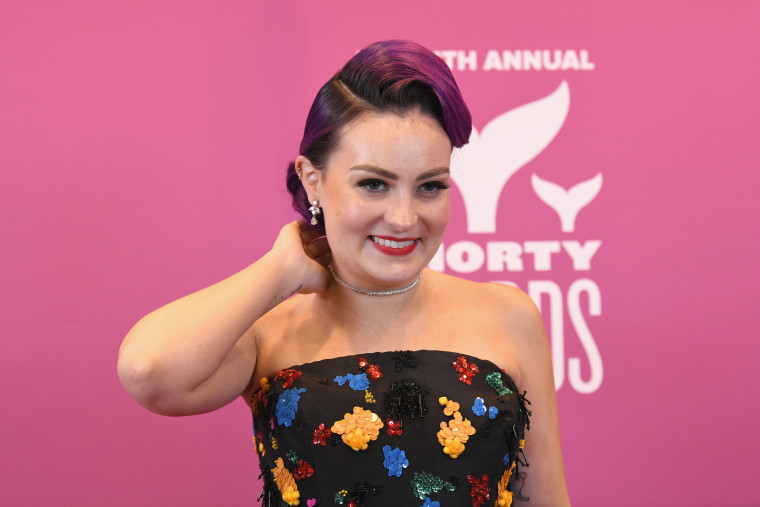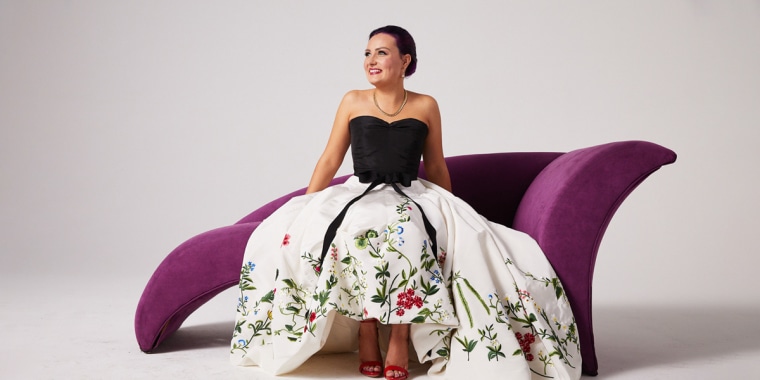Throughout her childhood, YouTube star and motivational speaker Molly Burke was hoping for a cure for her blindness. In fact, she was a literal poster child for the Foundation Fighting Blindness Canada, a non-profit organization that funds research toward a cure.
“I was surrounded by the idea of a cure my whole life,” said Burke, who at 4 years old was diagnosed with retinitis pigmentosa, a rare retinal disease that causes a loss of vision. “So I spent my whole childhood fundraising for cures. I raised hundreds of thousands of dollars.”
Today, Burke, 25, has a new philosophy, as well as almost 2 million subscribers to her YouTube channel.
“I don’t even want to be cured now. I was told to believe it was better to be sighted, and I believe that dialogue is so destructive,” Burke said in an interview with Know Your Value. “How are we supposed to raise people to be confident and love themselves and accept who they are?”

Through her YouTube channel, Burke addresses the camera against colorful backgrounds out of her Los Angeles apartment. She posts light-hearted videos like: “How I Shop Online Blind,” “Trying to Bake Alone For The First Time Ever” and the Playtex-sponsored video “How Do I Know When I Have My Period Without Seeing It?” Sometimes, like the period video, she is responding to curious fans.
“I was so scared, but I think I’m at a point where, because I have that supportive community now, I’ve grown more comfortable being more and more open,” she said. “And you know what? [Menstruation] is an important topic and it's something we need!”
Burke’s business enterprise involves YouTube sponsorships, motivational speaking and writing. In 2016, she wrote a memoir, “Through My Eyes: Blind, Bullied, But Not Broken.” Her new audiobook “It’s Not What It Looks Like” is available through Audible.
Burke was born and raised in Oakville, Canada, just outside of Toronto. She started to realize she was different when she was 6 years old and in and out of hospitals for her retinal disease. She was bullied throughout school for being blind.
“The majority of disabled people get bullied growing up,” said Burke. “The kids go to the most vulnerable students. You’re clearly different. You stand out. We’re the easy targets. Of course we get bullied.”
Despite grappling with her own self-confidence, Burke was always interested in public speaking.
“I actually started public speaking when I was five. I loved it so much,” said Burke. “I stopped when I was 14 and going blind and dealing with my depression. I completely hid myself from the world. I was angry and confused. I was so hurt and scared of society because of how they were treating me, but eventually during my road to my recovery, I had this revelation that I couldn’t be angry if I wasn’t doing anything to educate society. I needed to fight for myself by raising awareness.”
She had been speaking for the Foundation for Fighting Blindness Canada for years when a teacher introduced Burke to the “social model of disability,” an academic theory which argues that society puts barriers on people with disabilities. In other words, it’s the world, and not the disabled, who are the issue. This was in stark contrast to the traditional “medical model of disability,” which argues that disabled people are not normal and therefore society must fight for a cure. The latter was the only model Burke had ever known before.

“I always felt like I was broken and needed to be fixed because that's what people push on you,” said Burke. “But after studying the social model of disability, I came to realize that I’m not broken at all. I can live a fulfilled and happy life as a blind person. The real problem is inaccessibility and the way the world views disabled.”
Burke spoke at her school and invoked the social model. After graduation, she took her motivational speaking on the road, where she shared stages with celebrities like singer Demi Lovato, activist Malala Yousafzai and Virgin Group founder Richard Branson. She met and shook hands with Canadian Prime Minister Justin Trudeau. She said she had a particular connection with actor Martin Sheen.
“It was my first event. I was an 18-year-old speaking to 20,000 people in Toronto … I was so scared,” she said. "I was publicly going to be sharing a story about how I was bullied at 14. Martin Sheen was another speaker. I was backstage with him, he gave me this beautiful rosary, and he was so supportive. He said: ‘you're gonna do so great. It's not about you, it's about them and who's watching, and what they need to hear.’ It took the responsibility off me to perform well. It's about giving yourself. That message was really important to me.”
Her family is also very supportive. In fact, her mother currently works with Burke full-time on her freelance speaking, writing and YouTube business.
“My parents are like my best friends,” she said.
When she got burnt out on speaking (though she still speaks on a freelance basis), YouTube was a comfort to Burke.
“I didn’t have friends. I didn’t have girlfriends to go shopping with or talk about boys with, so I turned to the beauty community on YouTube. They felt like my friends and my sisters,’ she said. “I thought it was amazing that you could build such a community without even knowing each other.”
Burke started her own channel about five years ago as a creative outlet, and because she had other interests in addition to disability rights.
“Nobody is gonna book me to talk about bath bombs and makeup and bad dates, but those are the things that make up Molly,” she said. “Molly isn’t just a blind bullied girl ... Once I started wearing the clothes I liked and letting my awkward blind girl moments shamelessly show, and making a joke of it, owning it, I liked who I was better. It attracted people to me because they could see that confidence and joy.”
After posting once or twice a week over two years, she gained 5,000 subscribers. Five years in, she has 1.8 million subscribers and multiple sponsorships. She enjoys the back and forth between herself and the supportive community. She’s even able to rise above the inevitable negative comments and continued discrimination.
“I never stopped being bullied. Even to this day, I face discrimination every day. That’s a humbling thing,” she said. “That doesn’t change just because I love myself or have a following online, or because I can pay my bills,” she said. “But I love who I am, so other peoples’ judgements of me just bounce right off of me. You don’t even know who I am, and I love who I am so it doesn’t matter what you say and what you think of me.”
